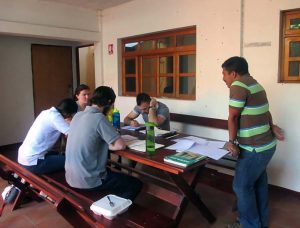Learn Spanish free
Learn Spanish free: In 20+ years of teaching, I’ve observed that a majority of Spanish students make similar mistakes. It’s important to correct these mistakes early in the learning process before they become a habit; for this reason I want to show you the most common Spanish mistakes students make:

- Es fácil / Es difícil: As a beginning student one of the first phrases you will learn is ES FÁCIL (It’s easy); The problem is that most students put the stress on the last syllable (CIL). The stress should always be placed on the accented syllable, which in this case is FÁ. The same goes for ES DIFÍCIL (It’s difficult): students place the stress on the last syllable (CIL) when it should be placed on the second syllable (FÍ).
- UN OTRA: Students will often say UN OTRA or UNA OTRA. This is incorrect. The correct usage is just OTRA.
- DE MIO: (OF MINE) The correct usage is MIO only. For example, “El teléfono es mio.” is correct, while “El teléfono es de mio.” is incorrect
- A ESTE MOMENTO (AT THIS MOMENT): This phrase is never used. The correct form is always EN ESTE MOMENTO.
- ESTOY TARDE (I’M LATE): The correct form is ESTOY RETRASADO/A; however, this phrase in most cases is too formal; most Spanish speakers prefer to say ME AGARRO LA TARDE.
- ESTOY EXCITADO (I’m excited): This phrase is used for talking about sex. The most common used phrase to describe excitement is ESTOY EMOCIONADO.
- MAS DE versus MAS QUE: MAS DE + a number : For example, “ Yo tengo más de dos hermanos .” MAS QUE= A comparison. For example, “? Quien tiene más trabajo? Yo tengo más que tú.”
- SITIO DE WEB: (WEBSITE): The correct phrase is SITIO WEB.
- LLEVAR & USAR: In Spanish we commonly use the verbs LLEVAR (to carry) and USAR (to use). LLEVAR is never used to discuss the wearing of certain types of clothing.
- QUIERO COMPRAR GROSERÍAS: Many Spanish students use this phrase when they want to buy groceries at the store. But GROSERÍA in Spanish means rudeness, not groceries! Learn Spanish free with us.